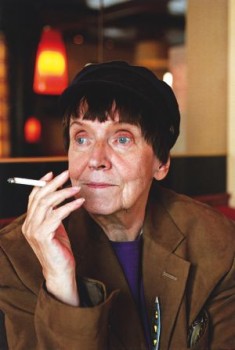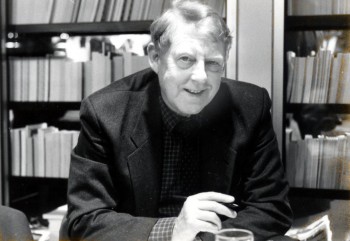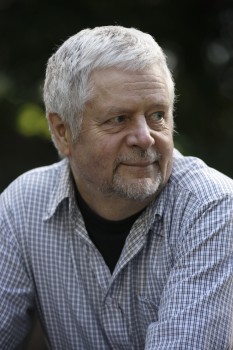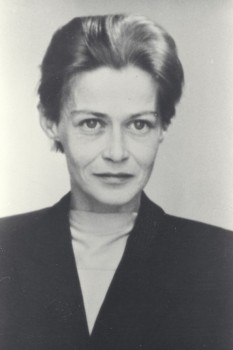Search results for ""mirkka rekola""
New from the archive
29 June 2015 | This 'n' that

Mirkka Rekola. Photo: Elina Laukkarinen/WSOY
Enigmatic stories, poems and aphorisms by Mirkka Rekola
This week, poems and aphoristic short stories by Mirkka Rekola (1931-2015).
Rekola, as the long-time Books from Finland translator Herbert Lomas put it, was ‘a minimalist before minimalism was invented’. Amazingly enough, her sparklingly terse writing was considered ‘difficult’, and she had to wait until the 1990s before her work was widely read.
Rekola produced her first collection, Vedessä palaa (‘Burning water’) in 1954, making the cardinal mistake of choosing as publisher the conservative WSOY rather than the avant-garde Otava. The book received mixed reviews; as she said, ‘for readers of traditional verse I was completely unfamiliar, while for ultra-modernists I was not modern enough.’
All the work we revisit here shows the extraordinary vividness, accuracy and exuberance of her writing – both in the poems and the often ruefully funny short stories called ‘Mickeys’.
![]()
The Books from Finland digitisation project continues, with a total of 402 articles and book excerpts made available on our website so far. Each week, we bring a newly digitised text to your attention.
Words like songs
The Finnish poet Helvi Juvonen (1919–1959) often studies small things: moles, lichen, bees and dwarf trees; she ‘doesn’t often dare to look at the clouds’. But small is beautiful; her nature poems and fairy-tales mix humility and the celebration of life. Commentary by Emily Jeremiah
Cup lichen
Luke 17:21
The lichen raised its fragile cup,
and rain filled it, and in the drop
the sky glittered, holding back the wind.
The lichen raised its fragile cup:
Now let’s toast the richness of our lives.
From Pohjajäätä [‘Ground-ice’], 1952) More…
In memoriam Herbert Lomas 1924–2011
23 September 2011 | In the news

Herbert Lomas. Photo: Soila Lehtonen
Herbert Lomas, English poet, literary critic and translator of Finnish literature, died on 9 September, aged 87.
Born in the Yorkshire village of Todmorden, Bertie lived for the past thirty years in the small town of Aldeburgh by the North Sea in Suffolk. (Read an interview with him in Books from Finland, November 2009.)
After serving two years in India during the war, Bertie taught English first in Greece, then in Finland, where he settled for 13 years. His translations – as well as many by his American-born wife Mary Lomas (died 1986) – were published from as early as 1976 in Books from Finland.
Bertie’s first collection of poetry (of a total of ten) appeared in 1969. His Letters in the Dark (1986) was an Observer book of the year, and he was the recipient of several literary prizes. His collected poems, A Casual Knack of Living, appeared in 2009.
In England Bertie won the Poetry Society’s 1991 biennial translation award for one of his anthologies, Contemporary Finnish Poetry. The Finnish government recognised his work in making Finnish literature better known when it made him a Knight First Class of Order of the White Rose of Finland in 1987.
To Books from Finland, he made an invaluable contribution over almost 35 years – an incredibly long time in the existence of a small literary magazine. The number of Finnish authors and poets whose work he made available in English is countless: classics, young writers, novelists, poets, dramatists.
Bertie’s speciality was ‘difficult’ poets, whose challenge lay in their use of end-rhymes, special vocabulary, rhythm or metre. He loved music, so the sounds and tones of words, their musicality, were among the things that fascinated him. Kirsi Kunnas’ hilarious, limerick-inspired children’s rhymes were among his best translations – although actually nothing in them would make the reader think that the originals might not have been written in English. A sample: There once was a crane / whose life was led / as a uniped. / It dangled its head / and from time to time said:/ It would be a pain / if I looked like a crane. (From Tiitiäisen satupuu, ‘Tittytumpkin’s fairy tree’, 1956, published in Books from Finland 1/1979.)
Bertie also translated work by Eeva-Liisa Manner, Paavo Haavikko, Mirkka Rekola, Pentti Holappa, Ilpo Tiihonen, Aaro Hellaakoski and Juhani Aho among many, many others; for example, the prolific writer Arto Paasilinna’s best-known novel, Jäniksen vuosi / The Year of the Hare, appeared in his translation in 1995. Johanna Sinisalo’s unusually (in the Finnish context) non-realist troll novel Ennen päivänlaskua ei voi / Not Before Sundown, subsequently translated into many other languages, appeared in 2003. His last translation for Books from Finland was of new poems by Vilja-Tuulia Huotarinen in 2009.
It was always fun to talk with Bertie about translations, language(s), writers, books, and life in general. He himself said he was a schoolboy at heart – which is easy to believe. He was funny, witty, inventive, impulsive, sometimes impatient – and thoroughly trustworthy: he just knew how to find the precise word, tone of voice, figure of speech. He had perfect poetic pitch. As dedicated and incredibly versatile translators are really hard to find anywhere, we all realise our good fortune – both for Finnish literature and for ourselves – to have worked, and enjoyed with such enjoyment, with Bertie.
Poet Aaro Hellaakoski (1893–1956) was not a self-avowed follower of Zen, but his last poems, in particular, show surprisingly close contacts with the philosophy. ‘Secrets of existence are revealed once one ceases seeking them’, the literary scholar Tero Tähtinen wrote in an essay published alongside Bertie’s new Hellaakoski translations in (the printed) Books from Finland (2/2007). Bertie was fond of Hellaakoski, whose existential verses fascinated him; among his 2007 translations is The new song (from Vartiossa, ‘On guard’, 1941):
The new song |
Uusi laulu |
| No compulsion, not a sting. | Ei mitään pakota, ei polta. |
| My body doesn’t seem to be. | On ruumis niinkuin ei oisikaan. |
| As if a nightbird started to sing | Kuin alkais kaukovainioilta |
| its far shy carol from some tree – | yölintu arka lauluaan |
| as if from its dim chrysalis | kuin hyönteistoukka heräämässä |
| a little grub awoke to bliss – | ois kotelossaan himmeässä |
| or someone struck from off his shoulder | kuin hartioiltaan joku loisi |
| a miserable old bugaboo – | pois köyhän muodon entisen |
| and a weird flying creature | ja outo lentäväinen oisi |
| stretched a fragile wing and flew. | ja nostais siiven kevyen. |
| Ah limitless bright light: | Oi kimmellystä ilman pielen. |
| the gift of lyrical flight! | Oi rikkautta laulun kielen. |
Images of isolation
31 March 1992 | Archives online, Fiction, poetry
Poems by Helvi Juvonen, commentary by Soila Lehtonen
Little is known of the circumstances of Helvi Juvonen’s life. Her fame rests on five collections of poetry – mixing humility and celebration with an uncompromising rigour – published in the ten years before her death at the age of 40 (a sixth appeared posthumously). Her existence, in the drab surroundings of post-war Helsinki, was modest: after studies at Helsinki University, and posts as a bank clerk and proof-reader, she lived by writing and translation, including some brilliant renderings into Finnish of the poems of the 19th-century American poet Emily Dickinson.
Helvi Juvonen’s universe is crowded with ostensibly insignificant phenomena: her eye discerns a mole, lichen, dwarf-trees, a shrew; she studies tones of stone and moss; she ‘doesn’t often dare to look at the clouds’.
Us
Rocks, forgotten within themselves,
have grown dear to me.
The trees’ singing, so useless,
is my friend.
Silver lichen,
brother in beggary,
please don’t hate my shadow
on the streaked rock. More…
Mole’s hole
31 March 1992 | Archives online, Fiction, Prose
Extracts from Pikku karhun talviunet (‘The little bear’s winter dreams’, published posthumously in 1974, edited by Mirkka Rekola), prose fragments and fairy-tales. (See commentary by Soila Lehtonen)
Vauveli-Vau had grown up. She went round to Mole Hill and went into Mole’s Hole, so she could work in peace. As there are a lot of Mole’s Holes in the earth, no one had any idea where Vauveli-Vau had gone. They weren’t all that keen to know, as there’s always rather a lot to do in Mole’s Hole: pine cones and branches to be collected, trips to be made to the spring in the forest, an eye kept on Dottypot in the fire-embers, and at night you have to get up to see which bird it is that’s singing in the old rotten tree. But still more laboursome are the thick books in foreign languages and the pile of blank paper.
Quite a few days and nights had gone by before Vauveli-Vau was used to being in Mole’s Hole. During those days a lot of remarkable things occurred. A slug flourished his horns and muttered: ‘Who on earth would want to lie about in his cottage in fine weather like this?’ More…



